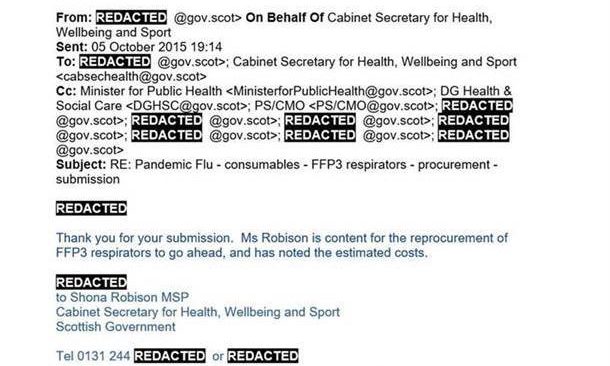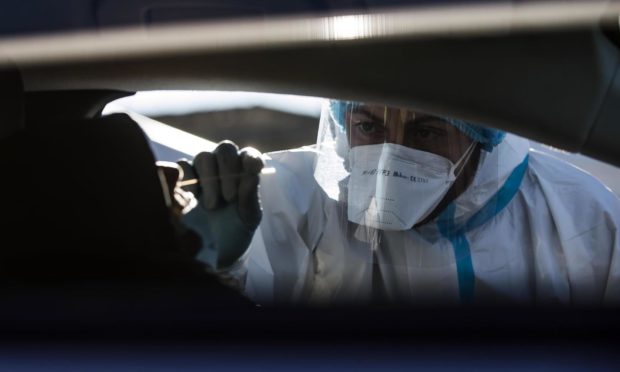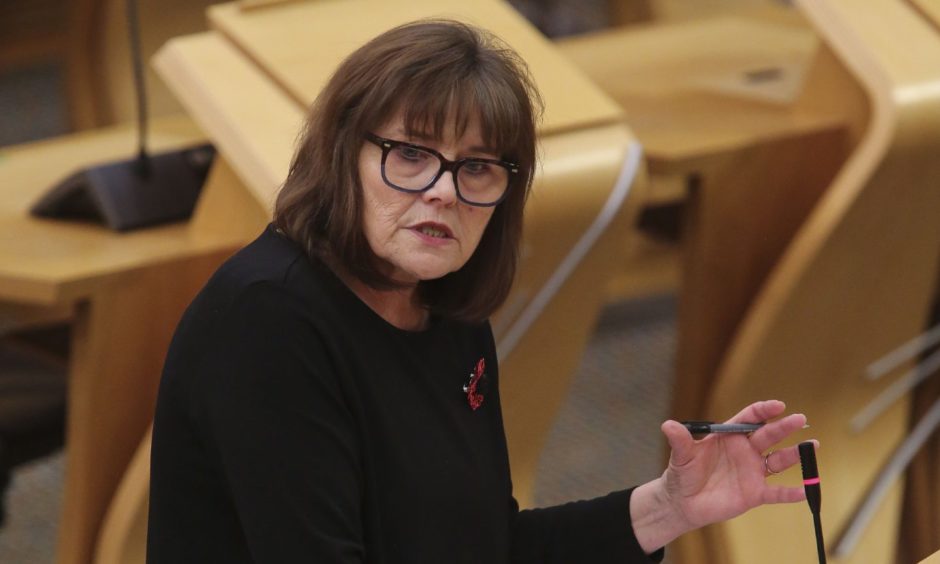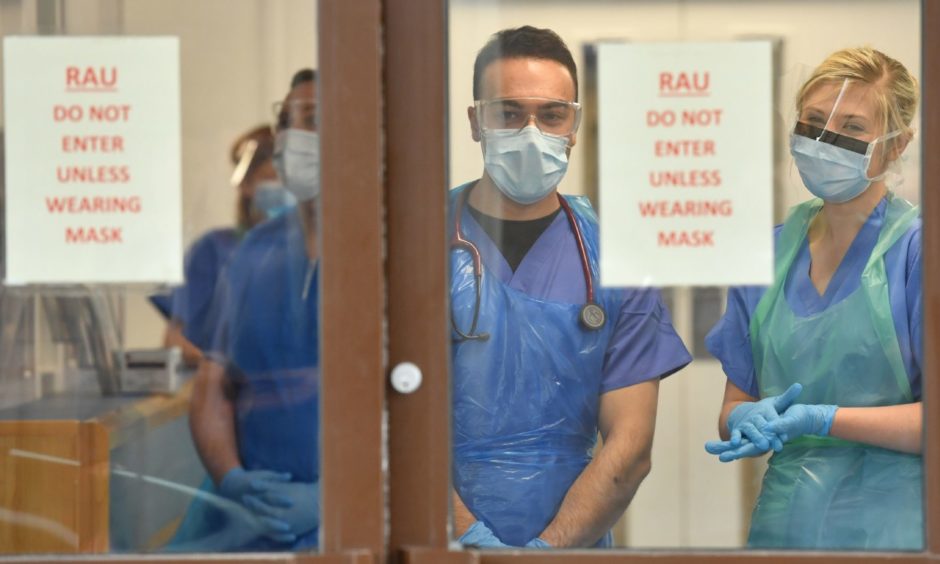Plans to spend millions of pounds replenishing Scotland’s supply of life-saving PPE were shelved after a last-minute intervention by Westminster.
A UK Government decision to postpone a joint procurement process left emergency pandemic supplies “depleted” and dependent on extending expiry dates.
Our investigation has found Scottish health chiefs privately questioned the move and asked whether it was driven by anything other than cost-cutting.
Memos obtained by this newspaper show SNP ministers approved a business case for a £4.23 million investment in vital FFP3 respirators for the nation’s pandemic stockpile back in October 2015.
Under the plans, one document suggested close to three million masks, with and without valves, would have been purchased for Scotland between 2016/17 and 2019/20.
Instead, as we previously reported, NHS chiefs in Scotland were shocked when the pandemic hit last year and they discovered the stockpile only had 37,800 of the respirators with valves, as the rest were out of date.
Almost five million of the FFP3 respirator masks have been required by health and social care workers in Scotland during the pandemic to date.
Throughout the crisis, concerns have been raised about the supply and quality of PPE needed by frontline staff, including the use of FFP3 respirators with expiry dates that have been pushed back more than once.
PPE talks took place in 2015
Correspondence released under freedom of information laws shows that discussions about replacing the stockpile of the PPE masks were held between Westminster and Holyrood officials throughout 2015, ahead of planned procurement in spring 2016.
Scottish health chiefs appeared to consider purchasing part of the nation’s requirement alone at one stage but, in the end, opted to procure 100% of supplies through a UK Government tendering process.
Memos show that Shona Robison, the health secretary at the time, approved the plans in principle in October 2015.

But just a month later the proposals were left in disarray following a U-turn by the Department of Health at Westminster.
On November 4, about three weeks before Chancellor George Osborne’s autumn spending review in 2015, a health official informed colleagues at Public Health England (PHE) and the devolved administrations of the surprise move.
“We are of the view that given the scale of the spend and the fact that the associated scientific and clinical issues have not been considered for some time, the department will need some clinical advice from NERVTAG to help it make informed decisions about the future provision for facemasks and respirators in NHS and social care settings to assure ourselves that they are being provided/used in the most clinically effective way,” the memo stated.
It added: “As we will not have advice in time to meet PHE’s original timetable, this will mean that we will experience a period with a depleted stockpile (we are awaiting advice from PHE on expiry dates).”

Reaction to Department of Health memo
The Scottish Government said the review did not impact on the nation’s preparedness for the pandemic.
However, emails show that Scottish health officials privately questioned the UK Government’s decision, and whether there was a need for fresh “clinical advice” from NERVTAG (the new and emerging respiratory virus threats advisory group).
One asked if there was “any further clarification on why we now think this is something which should be reviewed (beyond the financial side)”.
Another wrote: “I’ll need to explain to the minister why we are having this review, so I wondered if there was an existing debate or disagreement on the issue of FFP3 wearing, which has led to this, rather than just someone down south having looked at the existing evidence belatedly.”
And a senior official in Scotland’s chief medical officer directorate said: “Like you I’m not sure of the reasons behind examining the evidence at this specific moment in time rather than before this point.”

The NERVTAG sub-committee later agreed that FFP3 respirator use for all health care workers was “not fully supported by the current evidence base for either transmission or respirator effectiveness”.
The emails confirmed that the UK Government subsequently reached an agreement with the respirator manufacturers to extend the expiry date of much of the nation’s stockpiles by three years, to 2019/20.
In October 2017, a document shows that the Scottish Government was aware that the “majority of current national FFP3 stockpile… expires in 19/20”.
Jeane Freeman, the current Scottish health secretary, has previously admitted that there were issues with the supply of FFP3 respirators in the early days of the pandemic.
In May last year, she told Holyrood’s health committee: “We did not run out of them, but it was challenging at one point.”
Scottish Labour’s health spokeswoman, Monica Lennon, said: “It’s becoming clearer by the day that Scotland and the UK was poorly prepared for a pandemic.
“The Scottish Government must explain why it didn’t stand up to the UK Government.
“Never again can we cut corners on PPE and put people at risk. Tackling Covid-19 on the cheap has had tragic consequences.
“A public inquiry that examines the response to Covid-19 is long overdue and SNP ministers are wrong to delay it.”
Each nation has its own supply chain operation for PPE and is responsible for ensuring the right level of distribution within Northern Ireland, Wales, Scotland and England.”
UK Government spokesman
A spokesman for the British Medical Association (BMA) said: “While PPE supplies in Scotland did improve after issues were raised when the pandemic first reached the country, it is vital that we learn lessons going forward.
“A part of that must be how governments work together to ensure procurement and supplies of PPE are secured effectively and to ensure all staff are fully protected at work, which is the minimum they should expect.
“Scrutiny such as this should contribute to that process and we hope that both UK and Scottish governments liaise closely where necessary to get PPE to the frontline where it is needed.”
A spokesman for the UK Government’s Department of Health and Social Care said: “The UK Government and devolved administrations continue to work tirelessly together to make sure that frontline workers are protected with the PPE they need.
“Each nation has its own supply chain operation for PPE and is responsible for ensuring the right level of distribution within Northern Ireland, Wales, Scotland and England.
“Any expiry date alterations were based on independent testing to the standards set by the Health and Safety Executive.”
‘Adequate stock at all times’
A Scottish Government spokesman also said all PPE issued to NHS boards must have undergone specified testing, approved and reviewed by the Health and Safety Executive, to ensure its safety.
“Any review and discussions around supply therefore did not affect preparedness,” he said.
“From the outset of the pandemic, we acted quickly and decisively to expand and strengthen PPE supplies in Scotland, ensuring that all frontline health and social care workers have access to the PPE they need.
“We’ve had adequate stock of all forms of PPE supplies for the level of demand at all times.
“Revalidating stock and extending the shelf-life of masks is standard practice to maintain pandemic stock levels and this was used in relation to FFP3 respirator stocks as announced in March 2020.
“Prior to Covid, National Services Scotland (NSS) supplied around 52,000 FFP3 masks per year.
“The use of these masks increased significantly across health and social care from late March 2020 and since March 1 NSS has distributed 4.8 million FFP3 masks.
“In addition, we have supported many Scottish businesses to innovate and alter their production processes so they can start making key items like masks, gowns and hand sanitiser, making us less reliant on global supply chain, and we also created a dedicated team to secure PPE from abroad that arrived quickly and met our quality standards.”





